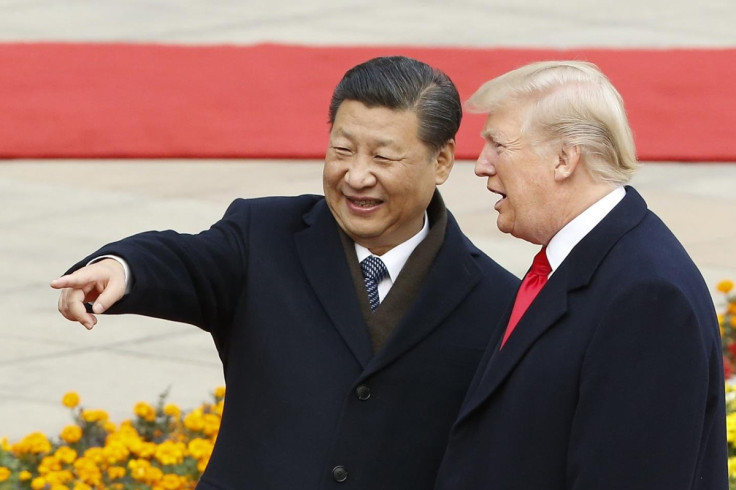You'll Be 'Eaten Up' By The Tiger: China Issues Global Warning Over Appeasing Trump On Trade
Reports suggest the US is pressuring allies to curb trade with China

China has sent a clear message to nations worldwide: giving in to Donald Trump's trade demands could have serious consequences for everyone. This warning highlights the rising tensions and the potential for widespread economic disruption.
China has cautioned nations against forging trade agreements with America that would hurt Beijing's interests, sharpening its tone amid a worsening trade conflict between the globe's two largest economic powers.
China's Stark Warning To The World
In response to reports indicating that US President Donald Trump's administration is pushing other countries to cut China off, a representative for China's Ministry of Commerce stated on Monday that Beijing 'will take countermeasures in a resolute and reciprocal manner' against nations that side with the US against it.
China's warning comes as countries prepare to talk with the US to seek exemptions from the 'reciprocal' tariffs that Trump had placed and then temporarily stopped for about 60 trading partners.
So, what's behind this latest trade argument? How much influence does China have in global commerce, and can Trump successfully divide other nations from Beijing?
The Underlying Issue
Recent reporting from The Wall Street Journal indicated that Trump aimed to use discussions about tariffs to pressure America's economic allies into reducing trade with China and limiting Beijing's robust manufacturing sector.
In exchange, these countries might gain lower US import taxes and fewer trade restrictions. The Trump administration has stated that it is currently in talks with over 70 nations.
On 21 April, China's Commerce Ministry responded sharply, cautioning other nations that 'seek one's own temporary selfish interests at the expense of others' interests is to seek the skin of a tiger.'
Essentially, Beijing contended that those attempting to make deals with the US – the tiger – would ultimately suffer the consequences themselves.
The ministry further added that China would, in turn, take action against any country that yielded to US pressure to harm Beijing. Following Trump's temporary halt of his 'reciprocal tariffs' on key US trade partners on 9 April, he intensified them on China.
Escalating Tensions In The US-China Trade Battle
American trade taxes on most Chinese goods have risen to 145 percent. Beijing has responded with its tariffs, set at 125 percent on US products. Trump has consistently accused China of taking advantage of the US in trade, portraying his tariffs as essential for revitalising domestic manufacturing and bringing jobs back to America.
Stephen Miller just laid it all out plain and simple.
— Joey Mannarino 🇺🇸 (@JoeyMannarinoUS) April 13, 2025
Trump hitting China with 145% tariffs is working like a charm to break their stranglehold on our economy.
This isn’t just talk, it’s saving American jobs and putting us first.
Miller is showing why Trump’s the only one with… pic.twitter.com/h8jhhVD9El
Trump also aims to use tariffs to fund upcoming tax reductions. Meanwhile, Chinese President Xi Jinping visited three Southeast Asian nations last week to strengthen regional connections. He urged trading partners, including Vietnam, to oppose one-sided coercion.
'There are no winners in trade wars and tariff wars,' Xi stated in an article released by Vietnamese news outlets, while not directly naming the US.
Caught In The Crossfire
Like other Southeast Asian nations, Vietnam has been caught in the middle of this trade conflict, per RMIT Vietnam. It serves not only as a manufacturing centre in its own right, but China also frequently uses it to ship goods to the US, aiming to bypass the tariffs that the initial Trump administration placed on Beijing in 2018.
President Xi Jinping arrives in Hanoi, Vietnam, greeted by enthusiastic crowds. (Source: CCTV ) pic.twitter.com/u6OXO7wexv
— China Perspective (@China_Fact) April 14, 2025
Notably, the Trump administration has commenced discussions with East Asian allies regarding the tariffs, with a Japanese delegation visiting Washington, DC, last week and South Korean officials scheduled to arrive this week.
The World's Dependence On Chinese Imports
Numerous nations currently find themselves in a difficult position, caught between the world's two largest economies: China, a major producer of manufactured goods and a vital trading partner, and the US, a critical market for their exports.
According to Alicia Garcia-Herrero, a Spanish economist and academic based in Hong Kong, some nations with especially strong trade ties to the US, such as Mexico, will likely 'say no to Chinese imports.'
However, she points out that 'China's presence in supply chains is so massive for most of America's other trade partners, decoupling is virtually impossible.' Globally, China has undeniably become a crucial provider of imported goods.
To illustrate, the European Union's trade deficit with China reached £322.16 billion (396 billion euros) in 2022, a significant increase from £123.05 billion (145 billion euros) in 2016. China supplies 20 percent of the European Union's imported goods.
In Great Britain, that figure is 10 percent. Last week, Treasury Secretary Rachel Reeves stated that reducing trade with China would be 'very foolish' for the UK. China's role in commerce is equally vital throughout the developing world.
Approximately a quarter of all goods imported by Bangladesh and Cambodia originate from China. Nearly one-fifth of the goods brought into Nigeria and Saudi Arabia are Chinese. 'Trump's trade policy is shortsighted,' Garcia-Herrero said.
'Trying to pry trade away with China may work in countries where the US has military bases. ... They may have to accept the US's concerns. But for most countries, particularly those in the Global South, the more that Trump threatens, the more that countries will go on China's side,' she added.
© Copyright IBTimes 2025. All rights reserved.






















